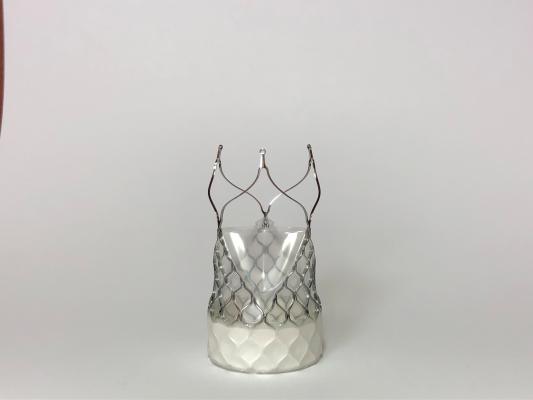
Transcatheter TRIA valve
February 28, 2022 - Foldax, Inc. has announced the presentation of results from the first animal study of its transcatheter valve from the TRIA biopolymer heart valve portfolio this past weekend at the Cardiovascular Research Technologies (CRT) annual conference. The transcatheter TRIA valve is the third product being developed by the company, with the company’s aortic surgical and mitral surgical valves currently being studied in humans.
Investigators for the pilot study of four ovine subjects reported “the TRIA TAVR (valve) demonstrated satisfactory deployment, function and good hemodynamic results. There was no pannus, calcification or thrombosis on leaflet surfaces (out to as long as 90 days post-implantation).” Investigators included Steven J. Yakubov, MD, of Riverside Methodist Hospital, and James Wittel and Garrett Johnson with Foldax.
On the basis of this pilot study, Foldax plans to conduct a larger pre-clinical study of its transcatheter valve in 2022 intended to support a first-in-human study.
“Expanding TAVR into young patients requires enhanced hemodynamics and durability with greater life expectancy. In this small animal study, we found that the TRIA transcatheter biopolymer valve showed promising hemodynamic results with encouraging durability,” said Yakubov. “Having a TAVR that can last the lifetime of a younger patient is something we need in cardiovascular medicine and it will be exciting to see outcomes from this valve as it moves into humans.”
With the TRIA valve platform, the company intends to reinvent every aspect of the heart valve – from material to design to manufacturing – by developing surgical and transcatheter valves designed to last a lifetime addressing the historical tradeoffs between tissue and mechanical valves. The TRIA valve platform reimagines the heart valve by combining the company’s proprietary LifePolymer with an innovative valve design intended to resist calcification, withstand stresses and strains without failure, and restore patient quality of life without requiring lifelong use of anticoagulants.
The company’s TRIA aortic surgical valve has been studied in humans out to two years. One year results for the aortic surgical valve recently published in JACC: Cardiovascular Interventions showed that it met all of its primary endpoints, including valve effective orifice area (EOA) and clinically significant improvement in New York Heart Association (NYHA) class.
“In the process of making a better valve, we will also be changing the face of the heart valve industry. The Company is democratizing the manufacturing of heart valves by eliminating the need for a central large skilled human workforce and replacing it with a small footprint robotic manufacturing pod that can be placed in any region of the world. We are not only solving historical problems with both tissue and mechanical valves, but also making valve manufacturing incredibly efficient and accessible,” said Foldax CEO Frank Maguire.
To learn more about Foldax, visit www.foldax.com
Related content:
Foldax Gets Indian Approval to Start Clinical Trial of Tria Biopolymer Surgical Aortic Valve
Foldax to Initiate FDA Clinical Study of Biopolymer Mitral Heart Valve
Foldax Gets $20 Million to Finance Innovative Heart Valve Technology


 December 24, 2025
December 24, 2025 









